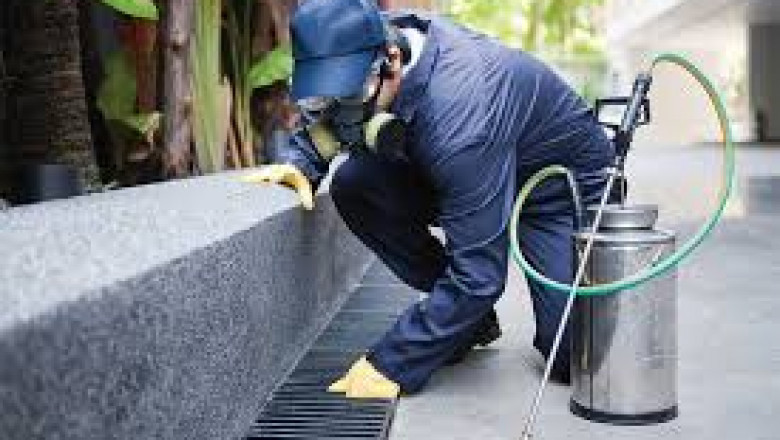views
If you’re considering a career in pest control or looking to expand your expertise in the field, becoming a fumigation technician might be the perfect path for you. This specialized role focuses on controlling pests using fumigants—chemical gases or vapors—to eliminate infestations in residential, commercial, or agricultural settings. In this comprehensive guide, we’ll explore what it takes to become a fumigation technician, the skills required, and why this career could be a rewarding choice.
What Is Fumigation?
Fumigation is a method of pest control that involves filling an area with gaseous pesticides to suffocate or poison pests. Unlike other forms of pest control that target specific insects or pests, fumigation is often used for more extensive infestations or in situations where other methods have failed. Common applications include:
-
Treating grain silos or warehouses
-
Controlling termites in homes
-
Protecting shipments of goods during transport
-
Ensuring the integrity of stored food products
Fumigation is a highly specialized procedure requiring specific training, equipment, and knowledge to execute effectively and safely.
Why Choose a Career as a Fumigation Technician?
A career in fumigation offers numerous benefits, including:
-
High Demand: With the increasing global focus on food safety and pest management, the need for skilled fumigation technicians is growing.
-
Specialization: This role allows you to specialize in a technical field, setting you apart from general pest control workers.
-
Career Growth: Opportunities for advancement exist, including supervisory roles or starting your own pest control business.
-
Job Satisfaction: Knowing that your work protects homes, businesses, and food supplies can be highly rewarding.
Skills and Qualifications Needed
To excel as a fumigation technician, you’ll need a combination of technical skills, physical fitness, and an understanding of safety protocols. Here are some key skills and qualifications:
-
Attention to Detail: Fumigation requires precise calculations to determine the correct dosage of chemicals.
-
Technical Knowledge: Understanding the chemistry of fumigants and how they interact with different pests is essential.
-
Physical Stamina: The job often involves manual labor, such as sealing buildings or carrying heavy equipment.
-
Safety Awareness: Strict adherence to safety guidelines is crucial to protect yourself and others from exposure to toxic chemicals.
-
Communication Skills: You’ll need to explain procedures and safety measures to clients.
Steps to Becoming a Fumigation Technician
1. Research the Field
Before committing to a career in fumigation, take the time to understand the industry. Speak with professionals, research job requirements, and consider shadowing a fumigation technician to gain firsthand experience.
2. Obtain Required Education
While a high school diploma is often sufficient for entry-level positions, additional education in biology, chemistry, or environmental science can be beneficial. Some programs offer specialized training in pest control and fumigation.
3. Enroll in a Training Course
Completing a training program is essential to becoming a certified fumigation technician. These courses cover topics such as:
-
Types of fumigants
-
Application techniques
-
Safety protocols
-
Pest identification
-
Legal regulations
4. Gain Certification
In most regions, you’ll need to pass a certification exam to work as a fumigation technician. Certification ensures you understand the safe and effective use of fumigants and comply with local laws.
5. Acquire Hands-On Experience
Many employers prefer candidates with practical experience. Look for internships or entry-level positions in pest control companies to gain real-world skills.
6. Stay Updated
Pest control methods and regulations are constantly evolving. Regularly attend workshops, read industry publications, and pursue continuing education to stay ahead in your field.
The Importance of Safety in Fumigation
Fumigation involves working with highly toxic chemicals, making safety a top priority. Some critical safety measures include:
-
Using Personal Protective Equipment (PPE): Always wear appropriate gear, such as masks, gloves, and goggles.
-
Proper Ventilation: Ensure areas are well-ventilated before re-entry.
-
Monitoring Gas Levels: Use detection equipment to measure fumigant concentrations.
-
Emergency Preparedness: Have an action plan in case of accidental exposure or spills.
Career Opportunities
As a certified fumigation technician, you can pursue various career paths, such as:
-
Residential Pest Control: Treating homes for termites, bed bugs, and other pests.
-
Commercial Fumigation: Servicing warehouses, food processing plants, and other businesses.
-
Agricultural Pest Management: Protecting crops and stored grains from infestation.
-
International Trade Compliance: Ensuring shipments meet quarantine regulations.
Challenges of the Job
While rewarding, a career in fumigation does come with its challenges:
-
Physical Demands: The job often involves heavy lifting, climbing, and long hours.
-
Health Risks: Exposure to toxic chemicals requires strict adherence to safety protocols.
-
Irregular Hours: Emergency infestations may require evening or weekend work.
-
High Responsibility: Ensuring safety for yourself, your team, and your clients is paramount.
Tips for Success
-
Invest in Quality Equipment: Reliable tools and safety gear are essential for effective fumigation.
-
Build a Strong Network: Connect with other professionals in the industry to share knowledge and opportunities.
-
Market Your Services: If you start your own business, invest in marketing to reach potential clients.
-
Emphasize Safety: Clients appreciate technicians who prioritize safety and professionalism.
7B Fumigation Technician Course
At the heart of your journey to becoming a certified fumigation technician lies the 7B Fumigation Technician Course. This specialized program equips you with the knowledge and skills to excel in this niche field. From understanding fumigant properties to mastering application techniques, the course is a comprehensive guide to professional fumigation.
Looking to the Future
The demand for skilled fumigation technicians is only expected to grow as industries place greater emphasis on pest management and food safety. Advances in technology, such as remote monitoring systems and environmentally friendly fumigants, are also shaping the future of this field.
Final Thoughts
Becoming a fumigation technician is a challenging but rewarding career choice. With the right training, certifications, and commitment to safety, you can build a successful career in this essential industry. Whether you’re looking to specialize or start a new career, the opportunities in fumigation are vast and promising.






















Comments
0 comment